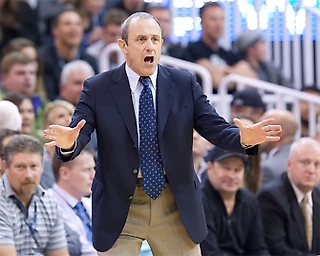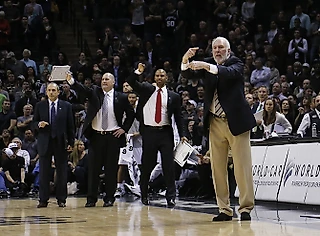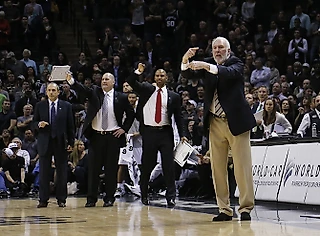Starting from scratch
As a rule, teams with shorter rosters tend to start seasons better than deep ones. The reason is simple – it takes less time to establish proper chemistry, define roles and distribute playing time amongst everybody.
Our current situation with CSKA is very similar to what we experienced back in 2005. With the exception of Viktor Khryapa, Sasha Kaun, Anton Ponkrashov and AndreyVorontsevich, I didn’t know any of the players personally at the start of the season. Consequently, besides actually coaching – which means teaching things I consider important – a lot of time is dedicated to trying to get a clear understanding of the personalities I have on the team.
Today we have all the means that allow us to scout a player extensively, review his actions in all possible situations before he’s even on the team. At the same time, it’s a lot harder to comprehend what kind of person he is, what his habits and daily routines are, what attitude towards practices he has.
Like, some of the guys are determined to practice really hard while others try not to invest too much energy. Also, some of the players are comfortable with the level of their game and a bit reluctant to explore new ways of doing things. They don’t strive to acquire new weapons, feeling comfortable in the well-known territory and choosing to avoid the stress that comes with leaving it.
Personally, it takes time for me to fully understand what kind of personalities players have and then get to the point where everybody embraces the only philosophy an ambitious club can have – being prepared day in and day out.
Sometimes it even comes to confrontations. Hopefully, it won’t be the case with CSKA, but it happened to me beforehand, as situations where I couldn’t come to a common philosophy with certain players occurred.
At the same time, I’ve been lucky enough in my career to have a lot of great people and great players – and the list of names would be too long – who realized that in order to win you have to prepare yourself in the best possible way. The fact that gets overlooked sometimes is that there are 24 teams in Euroleague and each and every one of them strives to prepare for the season as well as possible. So, if you miss something, safe bet is that you’ll find 23 teams that are better prepared. Talent in itself won’t bring you success.
So, you have to know your players and all their habits. And sometimes you even have to create stressful situations to make players understand their true limits and true potential.
Some players are not even aware of their potential. It’s like when you eat – right after dinner it’s hard to judge whether you’ve eaten too much, too little or just enough. Evaluating your body could be a tricky thing. Same with players on the court. Sometimes after the first sign of fatigue a player feels he’s reached his physical boundaries. And important games will challenge this feeling. In big contests, you have to be able to play tired. Mentally tired, physically tired, and sometimes both. That’s why it’s an important part of our work to help players test their limits and understand their true potential.
This can’t be done every day and at every game, but sometimes you as a coach need to put players into stressful situations and see how they react.
Another thing you do when you’re in charge of a newly-assembled team is help everybody find their roles. The roles are not just assigned. Sure, from the start you might have an idea of who could be more helpful in a supporting role and who has the talent and needs a prominent role to be effective. Still, only real action on the court will show you the truth. Sometimes a player with skills and intelligence of a “main guy” is better suited to stay away from the spotlight. There’s a football example, by the way. One of the greatest players to ever star for my beloved AC Milan was Franco Baresi. He never wanted to shine under the spotlight but still was fundamental for his team’s success.
On the contrary, sometimes guys who lack the same level of talent gain major roles because of their personalities, ability to lead the stage and withstand stress of big games. It’s like movie making – you have to find out who’s who and then help them accept who they are, especially in situations when a clearly supplementary player wouldn’t settle for anything short of star role which you just can’t grant him.
Then – and I’ve used this analogy before – I have to be a tailor who adjusts both offense and defense to suit the team in the best possible way. It also takes time. I have the basic idea, but lots of details need to be adjusted. It requires certain open-mindedness from my players who have to understand that some things we try this week, no matter how good in theory, may prove not good for us and it could be something different next week.
Same thing happens on defense. Though we’d all like our team to be able to defend pick-and-rolls in many different ways, we really need to understand which way is the best. After that, adjustments can be made on the game-to-game basis. You also have to understand whether your team can play zone, etc. There’s a lot of tailoring going on.
As a coach, you have to be open-minded as well. You definitely don’t want to keep hitting the wall with your head. You have to be smart. I’ve always believed there’s big difference between being intelligent and being smart. Intelligence means you understand what to do and how to do it. But you become smart by using your intelligence to reach the goals you’ve set. We have intelligent players on the CSKA roster, now we have to become smart as a team. And that means being able to use our intelligence while playing under pressure, being efficient and avoiding silly mistakes.
A tennis analogy – and it’s one of the sports I love the best – pops into mind here. Great tennis players don’t commit unforced mistakes. This is how you become smart and mentally strong as a team – by cutting unforced mistakes to the minimum. And once your opponent realizes you won’t give anything for free, it puts a lot of pressure on him.
This smartness is what defines a great team, alongside with mental toughness and talent. I’d even say, if I had to choose I’d probably go with talent first. It’s the most important ingredient, meaning that you’ve got to have a certain minimal level of talent in order to be successful. But great success only comes if you’re able to wrap this talent with mental toughness and add a good deal of smarts to the mix.
Another important issue, and this is something I’ve been very careful with throughout my career, is picking my “SWAT team” – an emergency unit deployed when thing don’t look good in a game. It doesn’t just mean having your five best players on the floor together. It could be three top guys and two players who just can get thing done under pressure and the threat of losing and know how to avoid mistakes. If I’m able to find my SWAT team quickly, it could save us some rough games.
Also, here comes the issue of defining who’ll have the ball in his hands in crunch time. It was a nice surprise to see our newcomer Sonny Weems assume this role so comfortably in our first two Euroleague games. He’s working hard, getting better every day and he has potential to become the proverbial go-to guy for us. Hopefully, we won’t find ourselves in those rough and bitter situations very often, but still it’s good to know that if it happens we have one, two or three guys ready to help us out. It will give our team some extra confidence and will buy us time.
They call me a strict coach now and then. Well, if pointing out when things are not done properly and ask for proper behavior and execution means being “strict”, I’m ok with it. But I’m not doing it for my own sake. I’m just a translator whose goal is to convey the toughness and the requirements of the competition to this group of players. I have to make them aware of all the challenges Euroleague presents, and after all these years I think I know those challenges pretty well. What I demand from them are the exact same things the tournament will demand as soon as they don CSKA uniforms and take the floor. A certain level of attention, desire, concentration, focus – all those things are a must in the Euroleague. Any mistake can prove fatal, you lose two games and you’re in big trouble. You just have to be focused and devoted.
Of course, approaches vary and trust could be a factor here as well. If a player’s history and previous behavior make him trustworthy, I’ll obviously have much more tolerance towards his mistakes. Take a guy like Viktor [Khryapa]. He’s proved himself a first-class player from mental standpoint. Working with him and other guys of his kind, it’s much easier to accept mistakes.
Look, if I go out to buy newspaper in Bologna without money and ask to pay for it later, the seller will probably give me the newspaper. That’s because he knows me really well and I’ve already paid him a hundred times. If I try to do the same in downtown Moscow, however, odds are I’ll end up empty-handed. Same thing for the player-coach relationship. Make me used to your good behavior, win me over with hard work and solid play – and you’ll have my trust. After that, even if you fail one, two, three times, I’ll still have trust in you because I know you. But if I don’t know you or worse see too many flaws and weaknesses in your behavior from the start, I’ll treat you differently.
And vice versa, by the way. As a coach, I know players expect certain things from me. I must be fair in my evaluations, meaning that I’ll always judge similar actions from different players the same. And I cannot hide from responsibilities, from admitting my mistakes, from making tough decisions under pressure, from giving clear explanations of why I did things a certain way.
I also believe in sharing ideas with my players. Like, I ask point guards for their opinions. I ask Viktor for his opinion as well, because he knows me and also because he’s been on many successful teams. And in general, every player is welcome to share their ideas and give important comments. Like, Sonny and Drew already approached me with their thoughts this season. In the end, this is a players’ game so if they have any suggestions on how to make it more comfortable – I’m open as long as they give their best and maintain focus. That’s what I’m telling them – as long as we’re passing the ball and playing defense, I’m ok with doing more post-ups, more pick-and-rolls, more zone or more man-to-man.






